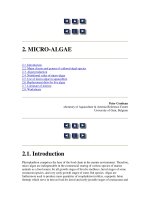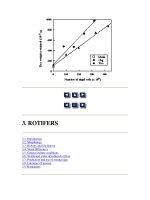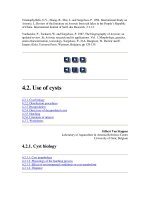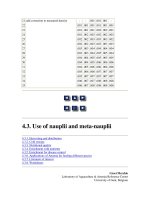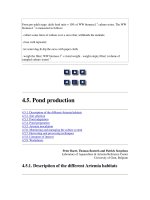The nature and effects of informal accountability for others
Bạn đang xem bản rút gọn của tài liệu. Xem và tải ngay bản đầy đủ của tài liệu tại đây (657.73 KB, 139 trang )
Florida State University Libraries
Electronic Theses, Treatises and Dissertations
The Graduate School
2006
The Nature and Effects of Informal
Accountability for Others
M. Todd (Matthew Todd) Royle
Follow this and additional works at the FSU Digital Library. For more information, please contact
THE FLORIDA STATE UNIVERSITY
COLLEGE OF BUSINESS
THE NATURE AND EFFECTS OF INFORMAL
ACCOUNTABILITY FOR OTHERS
By
M. TODD ROYLE
A Dissertation submitted to the
Department of Management
in partial fulfillment of the
requirements for the degree of
Doctor of Philosophy
Degree Awarded:
Fall Semester, 2006
The members of the Committee approve the Dissertation of M. Todd Royle defended on
July 26, 2006.
Wayne A. Hochwarter
Professor Directing Dissertation
G. Stacy Sirmans
Outside Committee Member
Gerald R. Ferris
Committee Member
Jack Fiorito
Committee Member
Angela T. Hall
Committee Member
Approved:
Caryn L. Beck-Dudley, Dean, College of Business
The Office of Graduate Studies has verified and approved the above named committee members.
ii
ACKNOWLEDGEMENTS
I have received immeasurable support from my parents. Throughout the years, their
support was both financial and emotional. I have been so blessed to have parents to talk to when
the days were long. I knew my father stood behind me and would understand the long hours. I
knew my mother would simply offer a kind, embracing word to the weary, and assure me that
what I was doing was worth the sacrifice.
A special place in my heart, and in this document is reserved for Kirstin Orphan.
She has lent her care, support, and ideas to me on many occasions. She has the patience
to both help troubleshoot technical aspects of my documents and to tolerate me. I
sincerely appreciate what she does to buoy my spirits and calm me when times are
troubling. Thank you Kirstin, my words are not enough.
My brothers are also a source of both strength and inspiration. It has been my
pleasure to grow up their “big brother” and an even greater pleasure to get to know them
as men. Gentlemen, our surfing, diving, and golfing trips have been some of the best
times of my life. Thanks.
Many years from now when I look back on my life and career, I think Dr. Wayne
Hochwarter will figure as one of the most influential people I ever met. It was he who is
largely responsible for bringing me into the doctoral program, and it was he who most
strongly influenced the work I have done here at Florida State University. Thank you so
much for taking countless hours to tutor me and develop my skills as an academic.
I am also grateful for the guidance of Dr. Jack Fiorito. He was the first person to
take me under his wing, and let me help him write. I would also like to thank Dr. Gerald
Ferris for all his support, guidance, encouragement, mentoring, and financial generosity
for conference travel. Their work ethics set the finest of examples for young researchers.
I would also like to thank Dr. Angela T. Hall for her guidance and support. She is
as close to sister as a man from a family of all boys will ever get. She has given me so
much support and information in the course of my doctoral studies that I feel almost
embarrassed thanking her. She is a wonderful sounding board, and a great friend. Few
individuals have her character and keen wit.
I would also be remiss if I did not thank the following individuals: Jason Stoner,
N. Paul Harvey, Kenneth Harris, Jim Zboja, and Clay Vorhees. Each of them has been
iii
both a good friend and a wonderful colleague. I would not have made it through this
program without them.
iv
TABLE OF CONTENTS
List of Tables
vii
List of Figures
ix
Abstract
x
INTRODUCTION
1
Implications for Theory and Practice
3
Overview of Relationships
5
Organization
6
LITERATURE REVIEW
8
Uncertainty as an Underpinning
8
Models of Accountability
11
Summary
21
MODEL AND HYPOTHESES
23
Antecedents of Informal Accountability for Others
24
Moderating Effects of Control on the Outcomes of IAFO
35
Conceptual Underpinnings
36
METHOD
44
Method Study 1
45
Method Study 2
51
RESULTS
55
Results of Study 1
55
Results of Study 2
58
DISCUSSION
62
Predictors of Informal Accountability for Others
62
The Moderating Effects of Control on IAFO-Job Outcome Relationships
68
Conclusion
84
APPENDICES
Appendix A: Employee Cover Letter and Opinion Questionnaire
99
Appendix B: Supervisor Cover Letter and Evaluation Questionnaire
107
Appendix C: Human Subjects Committee Approval Letter
108
v
REFERENCES
109
BIOGRAPHICAL SKETCH
129
vi
LIST OF TABLES
Table 1: Study 1 Scale Statistics, Means, Standard Deviations, and Results of Confirmatory
Factor Analysis
86
Table 2: Study 2 Scale Statistics, Means, Standard Deviations, and Results of Confirmatory
Factor Analysis
87
Table 3: Study 1 Results of Hierarchical Regression Analysis for Testing the Effects of
Independent Variables on IAFO
88
Table 4: Study 2 Hierarchical Regression Analysis Testing the Effects of Independent
Variables on IAFO
89
Table 5: Study 1 Moderated Regression Analysis of Control on the IAFO – Job Outcomes
Relationships
90
Table 6: Study 2 Moderated Regression Analysis of Control on the IAFO – Job Outcomes
Relationships
91
Table 7: Results of Simple Slope Analysis for Significant Interactions for Study 2 92
Table 8: Summary of the Tests of Hypotheses for Study 1
93
Table 9: Summary of the Tests of Hypotheses for Study 2
94
vii
LIST OF FIGURES
Figure 1: Model of Informal Accountability for Others
95
Figure 2: Interaction Graph of Contextual Performance Regressed on IAFO and Conservation of
Resources for Organizational Sample
96
Figure 3: Interaction Graph of Tension Regressed on IAFO and Self-Regulation for
Organizational Sample
97
Figure 4: Interaction Graph of Job Satisfaction Regressed on IAFO and Self-Regulation for
Organizational Sample
98
viii
ABSTRACT
Accountability is an important organizational phenomenon that has been recognized by
both academicians and practitioners as a fundamental element in the successful operation of
organizations (Tetlock, 1985; 1992; Ettore, 1992). Prior research has focused on different ways
in which individuals are affected by accountability conditions. However, research has heretofore
overlooked the possibility that individuals seek informal accountability for others.
Phenomenological researchers (Tetlock, 1985, 1992), Frink and Klimoski (1998) called
for the development models of accountability that include both external (to the person) and
internal conditions, objective and subjective factors, and formal accountability mechanisms (e.g.,
accounting procedures) and informal accountability mechanisms (e.g., norms and culture). The
current research has attempted to enfold these ideas as well as to examine informal
accountability for others as a tool of social influence with attendant job and individual outcomes.
ix
CHAPTER ONE
INTRODUCTION
The Importance of Informal Accountability for Others
Hard on the heels of several high-profile US corporate scandals (e.g., Enron,
WorldCom, Arthur Anderson, and most recently Fannie Mae) comes a growing concern
in both academic literature and popular press concerning a perceived lack of
accountability. Accountability is a fundamental aspect of both personal and
organizational life (Tetlock, 1985, 1992), and thus is critical for society to function
adequately. A lack of accountability may usurp a firm’s legitimate governance system of
checks and balances, consequently affecting the performance of the organization
adversely (Yarnold, Muesur, & Lyons, 1988; Enzele & Anderson, 1993). So
fundamental is accountability that Lerner and Tetlock (1999) contended that social
interactions would be impossible without it.
Accountability need not always be a formal system or reporting, and often
individuals will feel pulled in several different directions at once by various
constituencies (Cummings & Anton, 1990). This suggests that others are important in
determining how accountable one feels. To date, little research has dealt with the notion
that individuals may feel accountable for others at work. This is important for the field to
ascertain if individuals actually do, and if so, what contributes to those feelings and why
might they be motivated to seek conditions of informal accountability. In order to
determine if this is the case, a model is needed that sheds light upon antecedent
conditions, consequences and possible moderators. The hypothesized model of informal
accountability for others in this dissertation addresses these concerns.
Study Aims
Despite the fact that accountability has been a matter of public discourse and
concern for some time, and is critical for proper organizational functioning, the construct
1
itself is vastly underdeveloped (Frink & Klimoski, 1998, 2004). To address this gap,
research has advocated the development of models that incorporate both formal (e.g.,
reporting of supervisors and subordinates) and informal (e.g., cultural and organizational
norms) dimensions (Frink & Klimoski, 1998, 2004). Tetlock (1985, 1992) contended that
systematic examinations of accountability are needed to explain how individuals react to
their subjective interpretations that exist in organizations.
Although informal accountability for others exists in virtually all work settings, it does
not mean individuals necessarily choose to accept it. Frink and Klimoski (1998, 2004)
noted that external conditions help shape perceptions of accountability, but that
ultimately it is the individual’s choice whether it is accepted. It is my contention that
individuals choose to engage in behaviors that demonstrate their accountability for others.
In other words, it is not just there, it is enacted and embraced as a tool for managing the
environment and reducing uncertainty. This is consistent with control theory predictions
that individuals will engage in such behaviors because they seek to minimize the
discrepancy between their present condition and a desired goal state (Carver & Scheier,
1982).
In this dissertation, I will systematically investigate these subjective
interpretations in order to expand the field’s understanding of an informal dimension of
accountability. Specifically, I propose the existence and structure of informal
accountability for others and present a model that will be empirically tested. The premise
of this dissertation is based on the fact that people feel accountable for the attitudes and
behaviors of others in the organization regardless of their respective ranks, positions, or
any formal charter/mandate by the firm. Individuals may feel that they answer for not
only themselves but also for others (Morrison & Phelps, 1999). Further, when being
scrutinized by others, individuals perceive that they will be either rewarded or punished
by the organization or stakeholders.
In this dissertation, I intend to explicate the processes undertaken by individuals
to seek informal accountability for others, as well as examine antecedent conditions,
outcomes and potential moderators. Contemporary research has highlighted
accountability’s potential to affect strain reactions (e.g., Hall, Royle, Brymer, Perrewé,
Ferris, & Hochwarter, in press) and contextual performance (e.g., Royle, Hall,
2
Hochwarter, Perrewé, & Ferris, 2005). However, to date, the field has not attempted to
systematically examine if the same potentially harmful (stain) or organizationally helpful
(performance) outcomes surface for those informally accountable for others.
Implications for Theory and Practice
Theoretical contributions
Any investigation of informal accountability for others would be advised to
discuss potential moderators, especially when considering strain outcomes. Evidence of
moderation would inform the field of boundary conditions (e.g., informal accountability
for others might act as a stressor in the absence of control) as well as to partially replicate
prior research (e.g., Hall et al., 2005).
Substantial research regarding the moderating effects of control in stress related
outcomes (e.g., Dwyer & Ganster, 1991; Perrewé & Ganster, 1989; Ganster &
Schaubroeck, 1991) exists in the literature. Building on this research, studies have shown
that accountability acts as an agent of strain (e.g., Hall et al., 2005), most notably when
control is lacking. As such, findings have shown that control moderates the stressor-strain
relationships such that strain is reduced and job satisfaction increased when discretionary
behavior is allowed (Ganster & Schaubroeck, 1991). This dissertation will systematically
evaluate if control affects informal accountability for others in the same way.
It is my contention that a phenomenological (e.g., Tetlock, 1992, 1995)
examination of informal accountability for others will support prior research (Hall et al.,
2005). Specifically, perceptions of accountability demands are influenced by both
objective conditions created by both formal accountability and a subjective sense of
accountability of their own choosing (Tetlock, 1985, 1992). In this dissertation, I extend
theory by demonstrating that individuals purposefully seek informal accountability for
others. Individuals choose these conditions because properly signaling informal
accountability, while possessing both individual and organizational resources, provides a
number of favorable outcomes, one of which is to reduce future uncertainty.
3
Practical contributions
Of critical importance to this research is the evaluation of informal accountability
for others to act as a stressor. I also assess whether informal accountability for others
affects both on-the-job (e.g., task) and contextual performance (e.g., organizational
citizenship behaviors). Provided individuals have some control at work, they may choose
to publicly acknowledge their informal accountable for others. This choice may be
motivated by both self-serving directives and by a sincere interest in how others do their
jobs. In either case, those informally accountable for others will likely spend more time at
work mentoring, coordinating activities, or informally making quality control checks.
It is also possible that individuals may be motivated to seek informal
accountability for others based on their interest in the well-being of the organization.
Further, diligent attention to how others perform their jobs may require an individual to
carefully consider how well he/she is doing, and correct any deficiencies, thus improving
his/her performance. By assuming informal accountability for others, individuals
concerned about the firm may simultaneously reduce uncertainty for both themselves and
others.
Practical implications of this research relate to employees’ efforts to obtain or
maintain control in the face of the possible strain of informal accountability for others.
For example, some individuals are inclined to enhance their senses of personal control by
affecting, if not interfering, with the actions of others (Greenberger & Strasser, 1991). If
informal accountability for others can be shown to pose a threat to one’s ability to cope,
organizations may expect employee interference in attempts to reduce uncertainty.
This reality is important because it suggests that there are accountability features
in the firm’s immediate environment that it has only a limited ability to predict, or
control, but which might be engaged in by its members. However, it is possible to
identify individuals with this tendency to interfere with others. It is imperative that this is
recognized because it can be channeled in directions that facilitate the organization’s
contextual performance (Greenberger & Strasser, 1991).
Another practical implication of this research relates to the flattening of
organizational structures and increasing spans of control (Cascio, 1995). When an
organization reduces its levels, accountability for others is promoted. This is largely due
4
to a lack of authority and answerability with respect to position power. However,
accountability mechanisms are no less important in these organizations. In fact, if
informal accountability for others can be shown to positively affect performance and
satisfaction, firms may choose to try to hire those with personality traits that make them
likely to accept answerability for others as an informal mechanism of corporate
governance.
Overview of the Relationships
I propose that both contextual/organizational factors, as well as personal or
dispositional variables, act as antecedents to informal accountability for others. The
environmental conditions that contribute to an individual’s attempts to seek informal
accountability for others are related to embeddedness (Mitchell, Holtom, Lee, Sablynski,
& Erez, 2001; Lee, Mitchell, Sablynski, Burton, & Holtom, 2004). This manifests itself
in terms of the degree to which individuals feel like they fit and are linked to others in the
organization. Some of these linkages may be particularly important with respect to the
relative power of those with whom individuals are associated. In addition, there is a
relationship between being cohesively bound to a group with strong norms and being
responsible for others, (i.e. initiating change)(Morrison & Phelps, 1999; Hackman, 1983);
a related but distinct concept that will be discussed later in greater detail.
Not all factors that push individuals to seek informal accountability for others,
however, are derived from external cues. Many are hypothesized to be internal to the
individual. As such, the remaining predictors employed in this dissertation are individual
level, or dispositional, variables that promote the pursuit of informal accountability for
others. They included organization-based self-esteem (Pierce, Gardner, Cummings, &
Dunham, 1989), self-monitoring (Snyder, 1974, 1979, 1987), individual needs
(McClelland, 1961), and conscientiousness (Hogan, 1983; McCrae & Costa, 1987).
Control, discussed earlier, is hypothesized to act a situational moderator between
informal accountability for others and the dependent variables: job satisfaction,
performance (both contextual and task-related) and job induced tension.
5
Organization
This dissertation unfolds as follows: Chapter Two will lay the foundations of
informal accountability for others and review relevant literature. It will also examine
responsibility for others, a related, but distinct construct (e.g., Morrison & Phelps, 1999).
Further, Chapter Two will include a synopsis of the seminal works and theories on the
topic of accountability along with social exchange theory (Blau, 1964), the norm of
reciprocity (Gouldner, 1960), and models of leader-member exchange (LMX) (e.g.,
Dienesch & Liden, 1986), because they act as the theoretical drivers of informal
accountability for others. Finally, I systematically converge on the importance of
informal accountability for others by exposing potential gaps in existing theory and
suggesting how they might be bridged.
Chapter Three introduces the dissertation model and hypotheses. This model includes
antecedents, moderators, and outcomes. A parsimonious review of findings related to
both the independent and dependent will be provided prior to melding them into a
discussion of informal accountability for others.
Chapter Four outlines the methods proposed to test the model. A summary of a
proposed research sample will be offered, as well as an explanation of requirements
related to conducting hierarchical moderated regression analyses, including the
calculation of a minimum sample size and statistical power, and the contributions of
structural equation modeling for confirmatory factor analysis. Finally, a list of the
proposed measures to be used will be provided, which will include examples of response
formats, and the coefficient alphas that have been shown in previous research as well as
those created or amended for this dissertation.
Chapter Five will present the findings of the data analysis. Tables and figures will
be presented that highlight the regression results, coherently and succinctly frame the
moderated regression results as well as graphing significant interactions. Overall
synopses of the results for both samples are then provided.
Chapter Six is presents a broader and deeper discussion of the findings note in
Chapter Five. It will lay out what was good about the study, in terms of its positive
findings, its methodology, and its data analysis techniques. Concomitantly, I will discuss
6
the shortcomings of this dissertation, discuss, post-hoc, the possible reasons for failed
hypotheses, and directions for future research. In addition, a section on the potential value
of this work to parishioners’ is provided followed by a brief, overall, conclusion.
7
CHAPTER TWO
LITERATURE REVIEW
Uncertainty As An Underpinning
No matter what individuals do, there will always be some aspects of the future
that cannot be predicted or controlled. However, this does indicate that they wish to do
so. Individuals often engage in behaviors that reduce future uncertainties to help offset
their associated fears. According to Epstein (1999), all individuals experience some
aversion to uncertainty. Epstein (1999) defined uncertainty aversion as large class of
preferences wherein information about the future is too imprecise to be conceptualized in
terms of a probability of occurrence, but which individuals, nonetheless, conceive of as
an eventuality.
In order to avoid semantic misunderstandings, Epstein (1999) noted that the
related notion of risk is similar to uncertainty, but differs in that risk intones that
individuals have a more precise idea of the probability of some future event (e.g., a 50%
chance that one’s stocks will increase in value). As noted, the “large class” associated
with uncertainty contains the similar, if not sometimes interchangeable, notions of
“vagueness” and “ambiguity”. In my dissertation, I will continue to use the umbrella term
“uncertainty” because it is more inclusive.
Expectancies and Uncertainty
O’Driscoll and Beehr (1994) contended that uncertainty contributes to work
related affect and strain. They noted that the amount of uncertainty that one feels is
related to unpredictability about the consequences of role performance. Further, they
noted that ambiguous situations are generally dissatisfying. Along those lines, Beehr and
Bhagat (1985) extended expectancy theory (e.g., Vroom, 1964; Porter & Lawler, 1968),
which they applied to conditions of uncertainty. They suggested that two potentially
important types of uncertainty exist: (1) effort-to-performance (E-P) and (2)
performance-to-outcome (P-O) uncertainty. In other words, people are uneasy when they
do not know if their work-related efforts will achieve even minimal standards of
8
acceptability. Furthermore, their anxiety is heightened when they do not know if what
they do will be valued by important members of the organization (P-O).
O’Driscoll and Beehr (1994), working on the assumption that employees seek
social approval, noted that the way a supervisor reacts to a subordinate affects one’s
willingness to stay in an organization. Along with E-P and P-O expectancies, not
knowing whether a supervisor accepts one is an integral part of uncertainty. In other
words, not knowing if one is liked or approved of by a superior contributes to
dissatisfaction and turnover intentions. Individuals will seek informal accountability
conditions if they feel that their gestures will be noticed (E-P) and that they can achieve
an increase in status. Further, if these overtures are well received, individuals will be
perceived as informally answerable for others, which makes them appear cooperative (PO), and thus commendable.
Roles, Exchanges, and Uncertainty
Role theory (Kahn, Wolfe, Quinn, & Snoek, 1964; Katz & Kahn, 1978) suggests
that subordinates (e.g., role takers) are attuned to expectations that are communicated by
superiors (e.g., role senders). Concomitantly, role takers use these perceived expectations
to shape their attitudes and guide behavior. Many of the resulting behaviors are aimed at
reducing uncertainty. For example, when individuals perceive that being a proactive
problem solver is expected (e.g., Morrison & Phelps, 1994), they may seek informal
accountability for others as a means to both exemplify this virtue and correct a
performance decrement in others for whom they answer.
The role senders’ expectations may be communicated in many ways: sometimes
formally, as when individuals instruct others in the requirements of their jobs; often
informally, as when a colleague expresses admiration or disappointment in a particular
behavior (Kahn, et al., 1964). Given the informal nature of informal accountability for
others, it is unlikely that role expectations are clearly articulated in a job description.
Rather, individuals are likely to pursue informal accountability for others because it
exemplifies virtues that leaders have publicly lauded (e.g., the desirability of being a
good team player).
Clearly, individuals often behave in ways perceived to lead others to form
favorable opinions. This is done because individuals are aware that impressions make a
9
difference in terms of how well individuals are liked, respected, or perhaps feared (Leary,
1996). Self-focused tactics are meant to enhance individuals in the eyes of those to whom
they are accountable (Leary, 1996). Those who are successful in this respect are thought
to be diligent, cooperative, model employees (Zivnuska, Kacmar, Witt, Carlson, &
Bratton, 2004). Proclaiming one’s informal accountability for others might be considered
a self-focused impression management tactic because it makes one appear to be diligent,
thus increasing affect and respect. The benefits accrued by this action are explicated
further in models of leader-member exchange (LMX).
LMX and Informal Accountability for Others
Informal accountability for others’ goal of uncertainty reduction fits with the
central tenants of LMX theory. If individuals make favorable impressions on supervisors,
and subsequently develop positive affective relationships, they are channeled into an “ingroup” (Diensch & Liden, 1986). Members of this group are privy to benefits such as
positive performance evaluations, the possibilities of promotions and higher than average
pay-raises. They also experience fewer desires to leave the organization (Dienesch &
Liden, 1986; Wayne & Ferris, 1990; Wayne & Liden, 1995; Graen, Liden, & Hoel,
1982). By being part of the “in-group”, employees realize they have a positive
relationship with their supervisors. This belief is well founded given the supervisors’
tendencies to direct positive attention and training opportunities to those who are
members of well liked and positively evaluated (Dienesch & Liden, 1986).
Graen, Orris and Johnson (1963) noted that individuals accomplish their work
through roles. Though roles may be incomplete and initially ambiguous, individuals have
a vested interest in the performance of others (Dienesch & Liden, 1986). The
establishment of roles is affected by Lord and Maher’s (1991) reciprocal influence model
wherein social perception is a sense making process that mediates between the behavior
of a supervisor and subordinate or between team members. In other words, it is the
interpretation of behavior, as opposed to the behavior per se, that impacts the inter-dyadic
relationship (Gioia, Thomas, Clark, & Chittipeddi, 1994).
It is my contention that by signaling that one informally answers for another that
he/she is making a concerted effort to shape perceptions of his/her role performance. By
assuming informal accountability for others, individuals will try to signal that they are
10
playing an important role in the organization. As such, they seek to have their roles to be
associated with diligence, trust, and possibly worthy of leadership advancement.
Models of Accountability
The Phenomenological View of Accountability
Lerner and Tetlock (1999) called accountability the implicit or explicit
expectation that one may be called on to justify one’s beliefs, feelings, and actions to
others. Although one might expect that accountability takes place only when a breach of
conduct has occurred (Cummings & Anton, 1990), it is possible that an individual could
be held accountable and rewarded for his/her diligent stewardship absent any
wrongdoing. Accountability generally implies that those who do not provide reasonable
justifications for their actions will be negatively sanctioned with consequences ranging
from disdainful looks to loss of one’s livelihood, liberty, or even life (Stenning, 1995).
Conversely, individuals who do provide sufficient justification for their actions will
experience positive consequences ranging from mitigation of punishment to reward.
The phenomenological view of accountability, based on Tetlock’s (1985, 1992)
social contingency model, includes several empirically distinguishable sub-components.
These include (a) the mere presence of others (individuals expect that another will
observe their performance (Zajonc, 1965; Zajonc & Sales 1966); (b) identifiability
(individuals believe that what they say or do will be linked to them personally) (Price,
1987; Zimbardo, 1970); (c) evaluation (participants expect that their performance will be
assessed by another according to some normative ground rules and with some implied
consequences) (Geen, 1991); and (d) reason-giving (individuals expect that they must
give reasons for their attitudes or behaviors) (Simonson & Nowlis, 2000).
Despite the prevalence of the phenomenological view, an interesting disconnect
exists in empirical investigations of accountability. The social contingency model (e.g.,
Tetlock, 1992) proposes that accountability is largely subjective, and internal. However,
the preponderance of empirical accountability studies has treated accountability as an
objective, external condition (Frink & Klimoski, 1998, 2004; Lerner & Tetlock, 1999).
This limitation has caused researchers to potentially miss many facets of informal
11
accountability for others leaving the construct largely underdeveloped. For example, no
systematic examination has been given to determining which personality variables,
internal to the actors, contribute to making one feel accountable for others that may not
be their formal subordinates.
Frink and Klimoski (1998, 2004) contended that too little attention has been paid
to the role of personality variables. Despite this contention, some research has identified
which personal characteristics interact with accountability to predict outcomes such as
performance (e.g., Frink & Ferris, 1999). The conclusion of these studies is that personal
characteristics, including Type A (Yarnold et al., 1988) and conscientiousness (Frink &
Ferris, 1999), moderate the relationship between accountability and work outcomes.
Personality variables are internal to individuals and are thus amenable to
phenomenological investigations. However, with respect to informal accountability for
others, some personality variables (e.g., conscientiousness) might act as antecedents as
opposed to moderators. For example, those high in conscientiousness might pursue
informal accountability for others to reduce uncertainty and attend to the social
functioning of organization.
Timing and prior knowledge of audience preference. A major feature of the
phenomenological view is its attention to individuals’ behaviors depending on the time at
which they realize that they are accountable. It is possible that individuals know a-priori
that they are accountable for a given course of action. On the other hand, they may not
know the audience to whom they answer until they have already made pertinent
decisions. The phenomenological view predicts different behaviors based on this
distinction.
Relying heavily on the work of Tetlock (1985, 1992), the phenomenological view
contends that individuals would enact one of three strategies for coping with
accountability demands. First, individuals may use the acceptability heuristic. This
involves guessing what the audience would want and trying to tailor a decision
accordingly. Second, preemptive self-criticism involves contemplating as many different
courses of actions as possible in order to devise an integrative solution. Finally,
retrospective rationality relates to defensive bolstering after a prior course of action
(Tetlock, 1985, 1992). Depending on when individuals become aware that they are
12
accountable, and if they know the attitudes of the audience to whom they answer, they
differentially apply any or all of these strategies.
Generally, studies have shown that when individuals believe they have to justify
their views, they express opinions consistent with those perceived to be held by the
audience (e.g., Brief, Dukerich, & Doran, 1991). These findings help substantiate
Tetlock’s (1985, 1992) contention that the acceptability heuristic (often resulting in the
rendering of lower quality, less cogent and complex decisions), is likely to occur as
individuals seek to conform as opposed to come up with the “best” solution. Individuals
do so because it is easier to conform than to critique their own thoughts (Tetlock, 1983;
Tetlock, Skitka, & Boettger, 1989). It is possible that being informally accountable for
others fosters the enactment of the acceptability heuristic if individuals know the
evaluative internal audience personally and are able to guess the reasons to they attribute
failure or success. For example, if the others for whom individuals are informally
accountable fail, and the evaluating audience thinks it is because they are unmotivated,
they are likely to claim that they did not push hard enough to succeed.
If individuals do not know the audience’s opinions, and thus cannot automatically
conform, Tetlock (1985, 1992) contended that they would preemptively self-criticize.
Studies have supported this hypothesis in both laboratory experiments (Mero &
Motowidlo, 1995) and field studies (Koonce, Anderson, & Marchant, 1995; Lord, 1992).
In terms of proactive behaviors, pre-emptive self-criticism is likely to yield the most
comprehensive and integrative decision making strategies. In effect, individuals consider
as many “angles” as possible before determining the most appropriate course of action.
Preemptive self-criticism plays a part in individuals’ pursuit of informal
accountability for others. For example, individuals may think carefully about how others
are doing their jobs and seek to be accountable for those who are both performing well
and struggling. Individuals might like to be believed to be informally accountable for
others who do well because they might be able to bask in their reflected glory, thus
ingratiating themselves to powerful others in the organization. On the other hand,
individuals may seek to be informally accountable for poorly performing individuals
because they feel that their continued underachievement threatens to undermine the well
13
being of the organization as a whole. As such, individuals may choose to assume
informal accountability for others in order to promote corrective measures.
Not knowing the opinions of the reviewing audience is not certain to produce
integrative strategic thinking. For example, both cognitive dissonance (Festinger, 1957)
and impression management theories (Schlenker, 1980); Tetlock (1985, 1992), predict
that individuals will engage in retrospective rationality (i.e., defensive bolstering) when
their behaviors are at odds with the opinions and standards of the reviewing audience.
Staw and Ross (1980) validated this assumption by showing that post-decisional
accountability encouraged individuals to generate reasons as why they were not wrong to
act as they did. Individuals might also try to undermine opponents’ claims to the contrary.
Escalation of commitment research indicates that post-decisional accountability increases
feelings of obligation to a course of action, especially for those that resulted in a loss
(e.g., Conlon & Wolf, 1980; Fox & Staw, 1979).
It is likely the case that defensive bolstering will occur when things go wrong
even if one is only informally accountable for another individual. For example, if an
individual decided to mentor an employee, and that individual fails to develop, the
mentor might be inclined to retrospectively bolster. The mentor might claim “he looked
good on paper… anybody would agree that he’s a go-getter… it’s not my fault he fizzled
out, I did everything I could.” This defensive bolstering helps buoy the mentor’s spirits in
the event that the constituency to which he/she is informally accountable assails his/her
competency as a mentor.
In order to understand the phenomenon of being accountable, one idea emerges
time and again. Aside from simply being apprehensive about being negatively evaluated,
individuals care about how they are viewed because, to some extent, they wish to reduce
uncertainty. They may employ numerous strategies like those mentioned above (e.g.,
preemptive self-criticism, defensive bolstering) in order to maintain a standing within the
organization that affords some peace of mind. In essence, they want to behave in ways
that help ensure that they remain employable and promotable.
Pyramid Model of Accountability
Accountability, in Schlenker’s terms, refers to being answerable to audiences for
performing to certain prescribed standards. This entails meeting obligations, duties, and
14
expectations (Schlenker, 1986; Schlenker & Weigold, 1989; Schlenker, Weigold, &
Doherty, 1991). The dimensions of these models are more formal and objective than are
phenomenological conceptualizations of accountability.
Schlenker et al. (1991) contended that when individuals are accountable, they
could be made to answer for attitudes or justify their conduct. These behaviors can be
scrutinized, judged, sanctioned, and potentially rewarded by audiences (Semin &
Manstead, 1983; Tetlock, 1985, 1992). Individuals establish prescriptions for conduct,
judge others’ performances in relation to those standards, and distribute rewards and
punishments based on these assessments.
The “evaluative reckonings” described by Schlenker and colleagues (e.g.,
Schlenker, 1986, Schlenker & Weigold, 1989; Schlenker et al., 1991) are value-laden
judgments that require an evaluator to have information about three key elements in order
to assign culpability. The elements necessary to make these judgments are: (1) the
prescriptions that should be guiding the actor's conduct on the occasion, (2) the event that
occurred that is relevant to those prescriptions, and (3) a set of identity images that are
relevant to the event and prescriptions and that describe the actor's roles, qualities,
convictions, and aspirations.
For example, parents, by virtue of their identities, are obligated to treat their
children in socially prescribed ways, and can be negatively sanctioned should they fail to
do so (Schlenker et al., 1994). Of course, they may also be lauded for doing an especially
meritorious job. In order to fully understand the context of an evaluation, one needs
information not only about the event itself but also about the relevant prescriptions and
the characteristics of the actor involved (Schlenker et al., 1994). Without exception,
evaluations involve information about all three elements, although the evaluator may
tacitly assume some of this information.
The three elements, and the linkages among them, depict a triangle when
visualized, thus the classification. Schlenker et al (1990) contended that the combined
strength of the three linkages determines how responsible an individual is judged to be.
That is, individuals are held responsible to the extent that (a) a clear set of prescriptions is
applicable to the event (prescription–event link), (b) the prescriptions are perceived to
bind an individual by virtue of his or her identity (prescription–identity link), and (c) the
15


